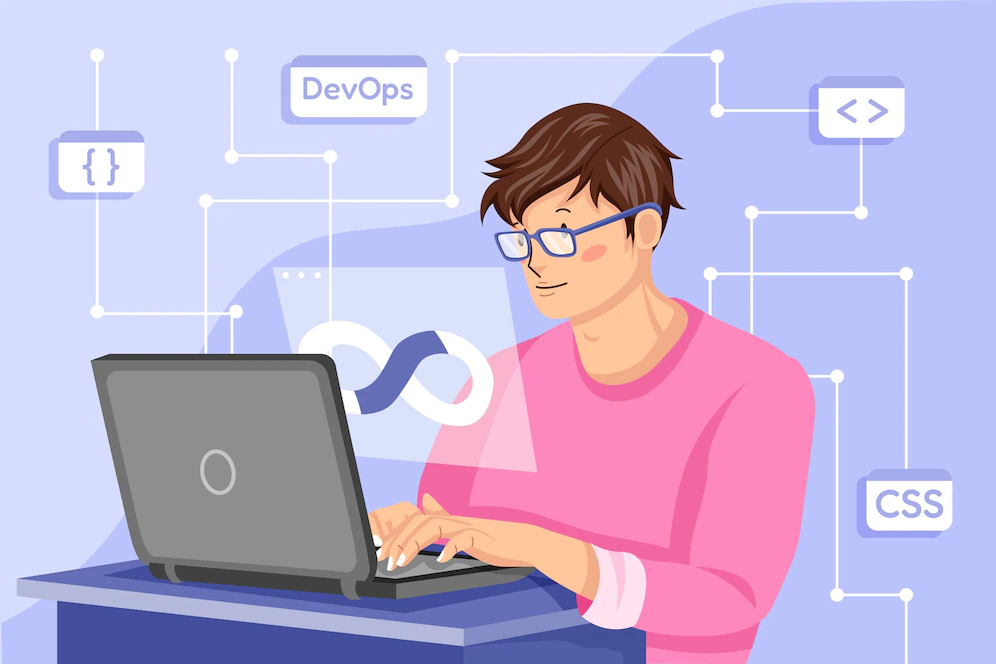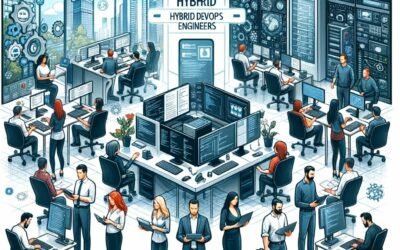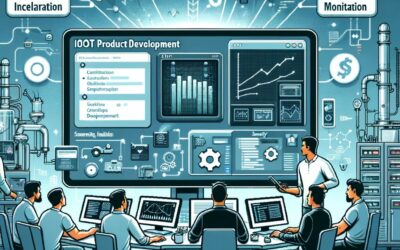As technology continues to advance at an unprecedented pace, the role of a DevOps Engineer in 2023 will become even more critical to the success of any business enterprise. The DevOps team is responsible for streamlining the development and operations process, ensuring efficient and effective delivery of products and services.
In this article, we will explore the roles and responsibilities of a DevOps team and how businesses can leverage their expertise to stay ahead of the competition and achieve their goals. Whether you are a DevOps Engineer looking to expand your skillset or a business enterprise seeking to optimize your operations, understanding the role of a DevOps team is essential. So, let’s dive in and take a closer look at the key roles and responsibilities that will shape the future of DevOps in 2023.
What Does a DevOps Engineer Do?
A DevOps engineer implements and maintains the processes and tools that allow effective collaboration between development and operations teams. Their primary focus is automating and streamlining the software development and deployment process. It includes building, testing, and deploying code.
Additionally, a DevOps engineer must be familiar with a wide range of technologies such as cloud platforms, containerization, and configuration management tools, as well as the principles of agile development and infrastructure as code. The role of a DevOps engineer is critical in helping organizations achieve faster time-to-market and higher levels of operational efficiency.
Top DevOps Engineer Skills
The top skills and expertise that a DevOps expert should possess include the following:
- Automation: One of the most critical skills a DevOps engineer should have is the ability to automate repetitive tasks. DevOps automation allows for faster and more efficient software delivery. Also, it helps to reduce human error. DevOps engineers should be skilled in utilizing automation tools such as Puppet, Ansible, and Chef.
- Cloud Computing: Cloud computing allows for greater scalability and flexibility. It also helps to reduce costs. DevOps engineers should have strong knowledge of cloud platforms such as Azure, AWS, and Google Cloud Platform.
- Containerization: Containerization is a crucial technology in DevOps. It allows for the easy deployment and scaling of the software product. Therefore, DevOps experts should effectively utilize containerization tools, including Docker and Kubernetes.
- Continuous integration and Continuous Delivery: DevOps experts should also be skilled in utilizing continuous integration and delivery (CI/CD) tools. These tools include Jenkins, Travis CI, and CircleCI. CI/CD tools allow for faster and more efficient software delivery.
- Monitoring and Logging: A DevOps engineer must be skilled in monitoring and logging tools like Prometheus, Grafana, and Elasticsearch. These tools help to collect and analyze data on the performance and availability of software systems.
- Communication and Collaboration: DevOps is a cross-functional field requiring engineers to work closely with other teams, such as developers, IT operations, and security. As a result, they should also possess strong communication and collaboration skills.
Top Job Roles in DevOps Team
A diverse range of job roles falls under the umbrella of DevOps. They include:
DevOps Evangelist
A DevOps evangelist is a highly skilled and experienced individual responsible for promoting the principles and practices of DevOps within an organization. They must stay updated with the latest industry trends and advancements. Also, they identify opportunities for improvement within the organization. DevOps evangelists play a critical role in a DevOps initiative’s success. They span the gap between the development and operations teams and ensure everyone works towards a common goal.
Release Manager
A Release Manager plays a vital role within a DevOps team. He is responsible for planning and managing the release of software updates and new features to production environments. In addition, they work closely with development teams, quality assurance teams, and operations teams to ensure that all releases are properly tested, validated, and deployed promptly and efficiently. The Release Manager is also responsible for creating and maintaining release schedules, managing release risks and dependencies, and communicating release status and timelines to stakeholders. This role demands strong leadership skills, attention to detail, and outstanding communication and project management skills.
SRE Engineer
The SRE (Site Reliability Engineer) is a specialized role within the DevOps teams that focuses on ensuring the availability, scalability, and performance of a company’s systems and services. They are responsible for designing and implementing automated processes that minimize downtime and improve overall system reliability. Also, they are required to work closely with the development team to identify and mitigate potential issues before they appear. Finally, they are involved in incident response and post-mortem analysis to prevent future disasters within the system.
Security Engineer
The security and compliance engineer in DevOps teams ensures the safety and stability of the systems and applications being developed and deployed. They collaborate closely with developers, system administrators, and other IT professionals to design and implement security measures. These security measures include firewalls, intrusion detection systems, and encryption protocols. In addition, their responsibilities include monitoring and responding to security incidents, conducting vulnerability assessments, and staying updated with the latest security trends and technologies. With the increasing threat of cyber-attacks and data breaches, having a skilled security engineer on the DevOps team is essential for any business enterprise to protect its important data.
Quality Assurance Lead
He is responsible for ensuring that all products and services meet the required criteria of quality and functionality. In addition, they work closely with the development team to ensure that the code is thoroughly tested and meets the requirements set out by the customer. The QA lead also plays a crucial role in identifying any issues or bugs that may arise during the development process. This role requires a strong understanding of software products and testing processes. Also, they should possess exceptional problem-solving and communication skills.
DevOps Automation Expert
A DevOps automation expert is a highly skilled individual who specializes in designing, building, and implementing automation strategies for software development and IT operations teams. This role is critical for businesses seeking to improve efficiency, reduce human error, and enhance the speed and quality of their software deliverables. DevOps automation experts must have a strong background in software development. In addition, he should have expertise in different programming languages and automation tools.
Product Owner (PO)
The Product Owner is an essential DevOps team member, helping to ensure that the product is delivered on time and meets the customer’s requirements. He is responsible for defining the business and customer requirements within the development team. Also, he works closely with the development team to ensure the product backlog aligns with the overall business objectives. PO is also responsible for communicating with stakeholders and making decisions on behalf of the development team. This role requires a deep understanding of the product, the market, and the customers, as well as strong communication and leadership skills.
Rising Demand for DevOps Talent
The demand for DevOps experts is rising rapidly as more businesses recognize the benefits of implementing a DevOps culture within their organization. In addition, as businesses continue to rely on technology to drive their operations, they will need highly skilled DevOps engineers to help them meet their goals.
Organizations are looking for DevOps experts who can help them streamline their development processes, improve collaboration between teams, and increase the speed of delivery. With the increasing demand for DevOps talent, it is time for DevOps specialists to expand their skills and knowledge to take advantage of this growing market opportunity.
Conclusion
The roles and responsibilities of DevOps teams are constantly evolving to meet the ever-changing demands of the technology industry. Hence, it is crucial to have a clear understanding of the different roles and responsibilities within a DevOps team to ensure efficient and effective collaboration between development and operations. In addition, having a team of experienced and highly skilled DevOps engineers who can efficiently manage the complexities of the modern technology landscape is crucial.
Looking to elevate your DevOps game? Hire the best-in-class DevOps engineers with a proven success record at Kloudeo. For more details, contact us today!
FAQ’s
Is DevOps a Good Career in 2023?
Yes, DevOps is a great career choice in 2023 and beyond! As more and more companies shift towards digital transformation and cloud-based infrastructure, the demand for skilled DevOps professionals is only going to increase.
Is DevOps a Technical Role?
DevOps is a highly technical role requiring a deep understanding of development and operations processes. It involves utilizing cutting-edge technologies and tools to automate and streamline the software development lifecycle, from code creation to deployment and maintenance.
What Is the Basic Salary of a DevOps Engineer?
The basic salary for a DevOps Engineer can differ depending on the company, location, and experience level. However, on average, a DevOps Engineer can earn around $90,000 to $120,000 annually.




